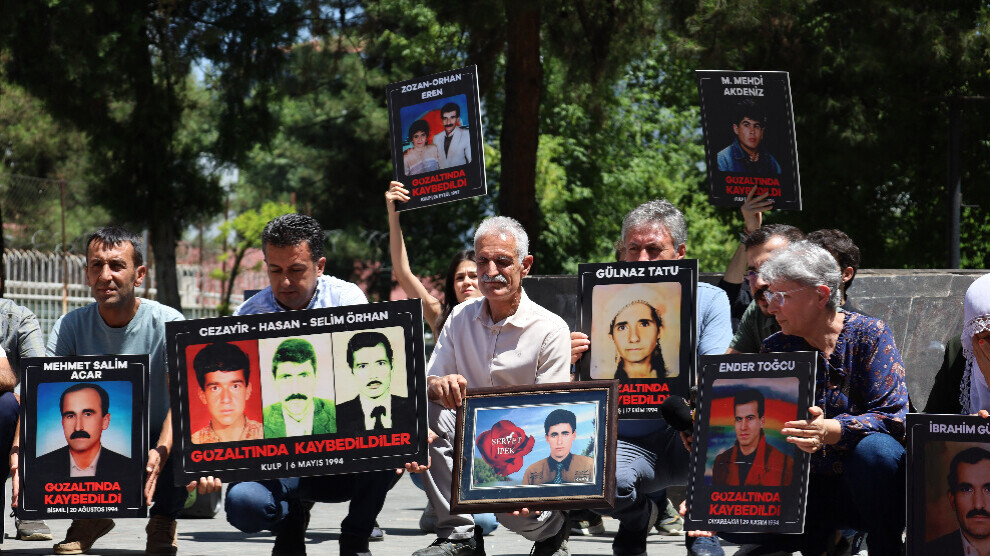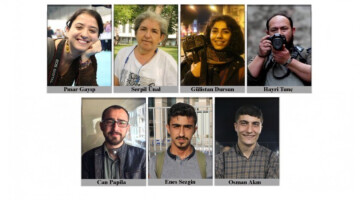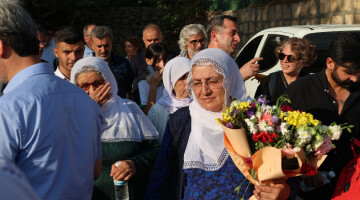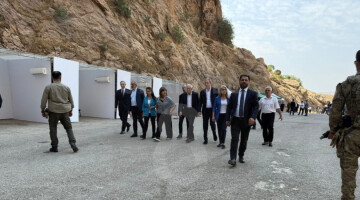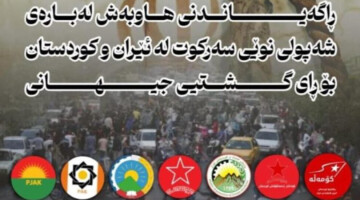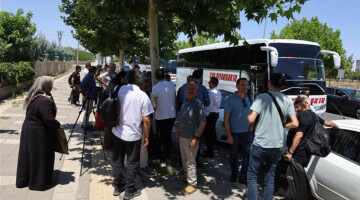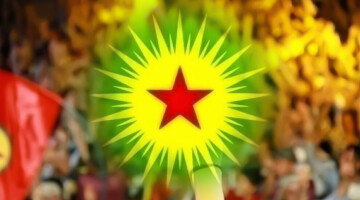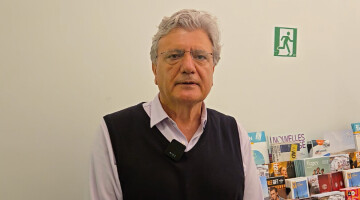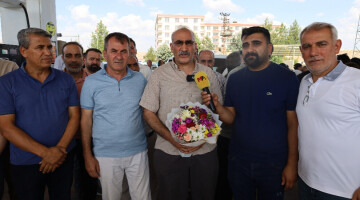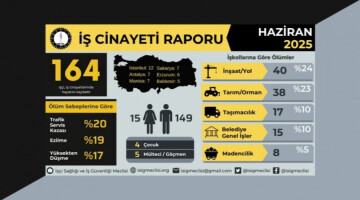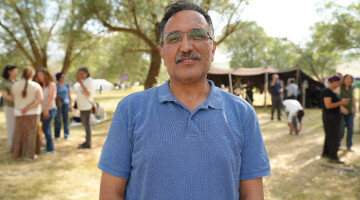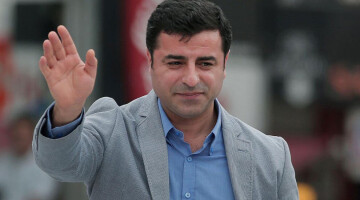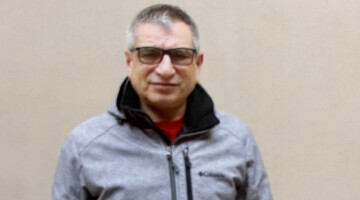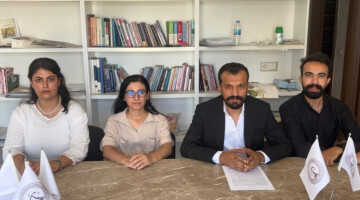Relatives of the disappeared people and members of the Amed Branch of the Human Rights Association (IHD) came together in front of the Right to Life Monument in Koşuyolu Park in Rezan (Bağlar) district of Amed for the 804th week of the "Let the disappeared people be found, and the perpetrators be tried" action.
This week, justice and truth were asked for People's Labor Party (HEP) Amed Provincial chair Vedat Aydın, who was abducted from his home to be detained on 5 July 1991, and whose lifeless body was found within the borders of Xarpêt's Maden district, on 7 July.
People's Equality and Democracy Party (DEM Party) Sur Municipality co-mayor Adnan Örhan (who is the son, nephew and cousin of three forcibly disappeared people), the family of HEP Amed Provincial chair Vedat Aydın, as well as many citizens attended the action.
IHD Amed Branch President Ercan Yılmaz, told Vedat Aydın's story.
Aydın was detained at his home by three JITEM personnel, who introduced themselves as police officers, on 5 July 1991. His body was found in Maden district of Elazığ, two days later, on 7 July.
Aydın, who had been arrested during the 12 September 1980 military coup, had spent 4 years in prison. After his release, he started working to establish the Human Rights Association (IHD) with a group of Kurdish intellectuals. Aydın, who was elected to the Board of Directors of the IHD Diyarbakır Branch in 1990, was arrested on 28 October 1990 for speaking in Kurdish at the IHD General Assembly held in Ankara.
Aydın made his defense in Kurdish at the hearing of the trial against him. He was elected to the Presidency of the IHD Diyarbakır Branch at the end of 1990, and was the provincial chair of the HEP Diyarbakır Provincial Congress in June 1991, after a 4-month detention period.
After being taken from his home on the night of 5 July 1991 by 3 JITEM personnel who introduced themselves as police, his tortured body was found under a bridge in the Maden district of Elazığ on 7 July.
At least 8 people lost their lives and dozens were injured as a result of the police attack on the march organized by hundreds of thousands of people attending the funeral in Diyarbakır on 10 July 1991, to the Mardin Kapı Cemetery.
Background
The Turkish state campaign of the 90s
The Turkish state campaign in the 90s against the Kurdish struggle for independence, was one of the most violent periods in the country’s recent history. And as a part of a Turkish political tradition, the Turkish state started to use its centuries-old tactics against it: mass killings and forced migration of ethnic groups.
It all started with the murder of Vedat Aydın
Vedat Aydın was the head of the People’s Labor Party (HEP) Amed (Diyarbakır) branch. He was a prominent figure and widely respected politician at that time. When he was taken into custody by the Turkish police on 5 July 1991, it wasn’t big news for anybody. The Turkish state’s oppression against Kurdish politicians was immense and custody or even torture was common at that time.
But things got complicated. The following day, Turkish officials denied that Vedat Aydin was in custody. There were reports of Turkish counter-guerrilla units killings in Şırnak, Cizre and Mardin but no one was thinking that a prominent figure like Vedat Aydın would be targeted.
On 7 July, an unidentified body was found under a bridge in Maden, a district of Elazığ province about 50 kilometres north of Amed. There were signs of extreme torture and multiple gunshot wounds on the body. Aydın’s family rushed to the morgue in Maden and identified the body.
Turkish police ready to kill
This murder sent shockwaves through the Kurdish community, especially Amed, Vedat Aydin’s hometown. Turkish authorities handed Aydın’s body to his family three days later. They were told that it was because of juridical processes. But it was something else. The Turkish state had its own preparations for the funeral. And when everything was set, they paved the way for the funeral.
More than a hundred thousand people attended the funeral. The ceremony was led by prominent figures of Kurdish politicians as well as human rights defenders and intellectuals. Aydin’s coffin was brought to Sümer Mosque in central Amed. After prayers, the crowd walked to Mardinkapi Cemetery for the burial.
The crowd was stopped before the cemetery’s entrance by the Turkish police. The police were saying that they wouldn’t let such a large crowd enter the cemetery. As there were talks to remove the police barrier, shots were heard.
The masked so-called special forces opened fire against the crowd. There was immense panic. Gunshots continued for 3-4 minutes. Four people were killed on the spot. Several were wounded and taken to the hospital.
After the first attack, the police removed the barrier and let the crowd move to the cemetery. The crowd gathered back again.
Aydin was buried after a short speech by his brother Deniz Aydın.
People deliberately targeted
Everybody thought that it was over and the crowd dispersed and most people started walking to the city center. But the road was blocked by Turkish police again. This time, there were more policemen, more special forces and armoured vehicles. The police let the crowd walk into the city in small groups. After most people passed the police barrier, only a few thousand people were waiting for the police’s permission to walk to the city center.
First there were three shots. Then hundreds of armed policemen started to open fire on the remaining people. A helicopter and an armoured vehicle were escorting the attack. People who were trying to flee the area were captured and beaten by Turkish police.
MPs Ahmet Türk, Orhan Doğan, Hatip Dicle and other Kurdish politicians were tortured along with journalists and human rights defenders.
The attack lasted around 20 minutes. It left 23 people dead and more than two thousand wounded. 19 were buried at night. Only 4 families were granted permission for a proper funeral.
23 people killed but no one appeared before court
No Turkish officials or policemen appeared before the court for the killing of innocent civilians. The murderers of Vedat Aydın were never found.
The murder of Vedat Aydın was the beginning of an era. An era of political murders and extrajudicial killings. Between 1991-99, several thousand Kurds were killed, including MP Mehmet Sincar. About two million Kurds were forced to migrate, about 17 thousand villages were burned to the ground.

